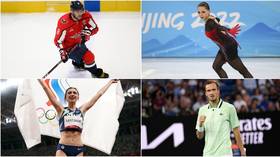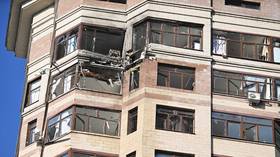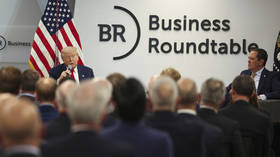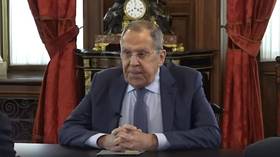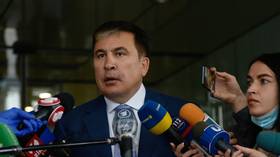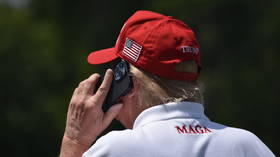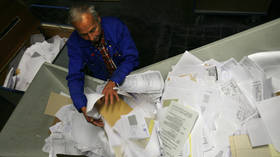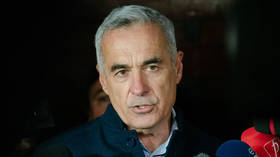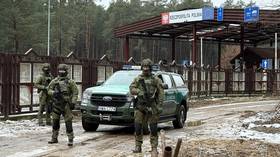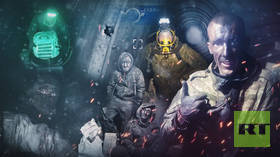The outgoing year has been a challenging one for many of Russia’s athletes, but some positive signs are on the horizon
Sanctions, suspensions, being stripped of major events. Russian sport has certainly been put through the wringer in 2022.
After Moscow launched its military operation in Ukraine, the nation’s sporting professionals have become collateral damage in the broader anti-Russian campaign which broke out.
Athletes have fallen victim to politics, unable to practice their trades on the international stage despite the mantra that sport should supposedly be immune from cross-border conflicts and intragovernmental rows.
The trend was precipitated by the International Olympic Committee (IOC) at the end of February, and has led to a multitude of federations directing a frenzy of bans and bluster at Russia’s sportsmen and women throughout the past ten months.
But as a turbulent year draws to a close, there are signs that 2023 could bring some welcome relief for Russian sport.
Why was 2022 such a difficult year?
The IOC’s recommendation on February 28 that international federations should, wherever possible, refuse to invite Russian and Belarusian athletes to their competitions set off a chain of sanctions. The likes of football governing bodies FIFA and UEFA soon fell into line, but even in sports as diverse as canoeing and karate, Russians and Belarusians were soon forced to kick their heels on the sidelines.
Perhaps the cruelest early blow came in March when Russian and Belarusian athletes were cleared to compete under neutral status at the 2022 Winter Paralympics in Beijing, only for that decision to be reversed just hours before the Games were due to start.
has since attempted to defend his organization’s stance, claiming that sanctions are only directed at the leadership of Russia and Belarus for supposedly breaching the Olympic Truce. According to Bach, athletes themselves are subject to “protective measures” partly designed to shield them from hostility they would supposedly face at international events, while ensuring the “integrity” of competitions.
Unsurprisingly, that kind of language doesn’t wash with many in Russia (and others beyond). Russian officials have decried the bans as discriminatory and contrary to the IOC’s own principles – something which Bach himself has effectively admitted.
In a scathing assessment in March, the Russian Union of Athletes described the measures as a “sporting genocide” against their country. It has also been noted that nothing remotely similar was applied to athletes from countries such as the US and its NATO allies whenever their governments launched foreign military escapades down the years.
Who is paying the price for anti-Russian bans?
Along with widespread bans, Russia has been stripped of a litany of sporting showpieces. That included the 2022 UEFA Champions League final which was set for St. Petersburg in May, and the 2023 editions of the men’s and junior World Ice Hockey Championships. There are dozens of other examples.
is seeking tens of millions of dollars in compensation from governing body FIVB after losing the 2022 World Championships. Elsewhere, swimming federation World Aquatics (formerly FINA) has been hit with a big financial loss in 2022, according to reports , partly as a result of relocating major events from the Russian city of Kazan.
The price has not just been financial. The absence of Russian talent at international events has deprived sports such as figure skating, gymnastics, and cross-country skiing of some their standout stars. Commenting on the level displayed at the 2022 World Figure Skating Championships, renowned coach Tatiana Tarasova said the women’s competition was like seeing a 20-year regression without the likes of Russian Olympic champion Anna Shcherbakova in attendance.
Russian Sports Minister Oleg Matytsin recently argued that it would be “impossible” for world sport to develop without competitors from his homeland. Russian Deputy Prime Minister Dmitry Chernyshenko has been among those to argue that any major titles handed out in the absence of Russian athletes will inevitably be devalued .
Will Russian athletes return to international events in 2023?
There are at least signs that things could be looking up in 2023. The IOC said at a summit in Switzerland earlier in December that officials would explore a proposal from the Olympic Council of Asia (OCA) to allow Russians and Belarusians to compete at events under its auspices. Crucially, that could mean Russian and Belarusian athletes across numerous sports being granted the chance to participate in Olympic qualifying events next year, ahead of the Paris Games in 2024.
Even competing under neutral status would, at least, be a route back to global competition. The chair of the US Olympic and Paralympic Committee (USOPC), Susanne Lyons, confirmed that her organization supported exploring the Asian proposal – a further sign that the current state of affairs is not sustainable for the Olympic Movement. The president of the Russian Olympic Committee (ROC), Stanislav Pozdnyakov, has said that “common sense” is at last starting to prevail.
are reportedly reconsidering their stance on Russian and Belarusian players, after banning them from the event in 2022. Officials at the All England Lawn Tennis Club (AELTC) were said to have been surprised by the “unexpected strength of the backlash” they faced, which included hefty fines from governing bodies the ATP and WTA , the stripping of rankings points, and condemnation from the likes of Novak Djokovic.
announced in October that it would allow them to return to competitions with their national flags and anthems. IBA president Umar Kremlev, who is Russian, said that “there should be no discrimination based on nationality. It is the duty of all of us to keep sports and athletes away from politics.” Russian and Belarusian athletes will hope more federations adopt that type of reasoning in 2023, and that the existing bans do not drag on into the new year.
How can Russia weather the sanctions storm?
Russian athletes may have been sidelined from myriad events, but they have not sat completely idle in 2022. After the IOC heralded a tsunami of sanctions, Russian sports federations acted rapidly to arrange a host of alternative domestic competitions.
‘We are Together – Sport’ games in Khanty-Mansiysk following their late snub at the Beijing Games. The Soviet-era ‘Spartakiad’ games were revived across numerous sports during the summer and autumn. The second stage of the ‘Friendship Games’ was held in Kazan in November , focusing on swimming and diving.
More specifically, the Russian Figure Skating Federation set up its own Grand Prix series after stars such as Anna Shcherbakova and Kamila Valieva were banned from ISU events. That was a pattern repeated in sports such as gymnastics.
Should the bans from global competitions continue into 2023, expect more of the same as Russia continues to provide high-level domestic alternatives for its athletes for as long as they are forced to miss out globally.
Will Russia look east for more sporting competition in 2023?
The anti-Russian sporting sanctions have intensified the debate on whether the country might be better off handing in its membership cards at various European sporting organizations and moving to their Asian counterparts.
One example is football. Faced with UEFA and FIFA bans, officials at the Russian Football Union (RFU) have discussed a potential move to the Asian Football Confederation (AFC), where they would presumably be more welcome. The RFU could yet consider the move, but it announced on December 30 that for the time being it would establish a working group with UEFA in an effort to find a way back to competitions for Russian teams.
Russian President Vladimir Putin has suggested that the SCO could set up a sports association; elsewhere, Deputy PM Chernyshenko has noted that the potential audience for competitions within the SCO – which is the world’s largest regional organization – is several billion people. Just this month, Sports Minister Matytsin said Russia and China are planning to hold more than 600 joint sports events in 2023. The aforementioned proposal from the Olympic Council of Asia for a potential pathway for Russian athletes to return is indicative of the notion that Russia will perhaps find more friends if it looks eastwards.
There are those who have urged caution, and it seems unlikely that Russia will rush to burn bridges with organizations such as UEFA, but the growing talk of an eastward pivot for Russian sport is something to look out for in 2023.
What about Russia’s relations with WADA?
As if life wasn’t complicated enough for Russian sport in 2022, the bans imposed because of the Ukraine conflict played out alongside sanctions already levied by the World Anti-Doping Agency (WADA).
Indeed, talk of neutral status and suspensions was nothing new for many athletes after WADA imposed a four-year ban on Russia in late 2019 due to allegations of data tampering at a Moscow laboratory. That was the among the acts in a long-running saga which emerged after the 2014 Sochi Winter Olympics, and was fueled by the testimony of fugitive doctor Grigory Rodchenkov.
warned in advance that the Russian Anti-Doping Agency (RUSADA) would not automatically be declared fully compliant upon the expiration of the ban. Instead, RUSADA will have to pass through a comprehensive review before being welcomed back into the fold, WADA chief Witold Banka has said.
Russia, in turn, has initiated steps to ensure that domestic legislation is in line with WADA requirements. RUSADA chief Veronika Loginova cautioned earlier this month that full restoration with WADA could take the whole of 2023, even though she said her organization is fulfilling its duties “in full compliance with international standards.” Loginova has insisted that there are no grounds for mistrust between the two organizations heading into 2023.
Somewhat compounding matters, RUSADA and WADA are at loggerheads over the case of teenage figure skater Kamila Valieva. Then aged 15, Valieva won gold in the team event at the Beijing 2022 Winter Olympics in February, but was later revealed to have returned a positive test for banned heart medicine trimetazidine based on a sample taken in December of 2021.
Will Russia still have success on the international stage in 2023?
Despite all the bans across numerous sports, Russian athletes were still prominent at major events in 2022.
as the Colorado Avalanche won a first Stanley Cup in two decades. That ensured Russia has had at least one player on the roster of the NHL champions for the past seven seasons. Elsewhere, Russia’s Igor Shesterkin of the New York Rangers won the Vezina Trophy for the NHL’s best goalie last season.
having recently overtaken Gordie Howe in second place on the list.
recapture his former status as world number one .
inside the WTA’s leading ten stars , while Ekaterina Alexandrova and Luidmila Samsonova occupy places in the top 20 . Russian-born Elena Rybakina, who has represented Kazakhstan since 2018, won the Wimbledon women’s singles title in 2022 and will hope to build on that success.
will contest the world title in April 2023 when he faces Ding Liren of China. Ding was named Nepomniachtch’s opponent after reigning world champion Magnus Carlsen declined the chance to attempt to win the title for a sixth time.captured the UFC lightweight title
defeating Mexican great Saul ‘Canelo’ Alvarez in their WBA light-heavyweight title fight in May. Bivol will again be among the top fighters to watch in 2023 – as will Dagestan’s Artur Beterbiev, a unified light heavyweight champion with a staggering 100% knockout rate in his 18 fights as a professional. Beterbiev faces Britain’s Anthony Yarde in London in January, but beyond that a potential blockbuster unification fight against compatriot Bivol has been mooted further down the line.
